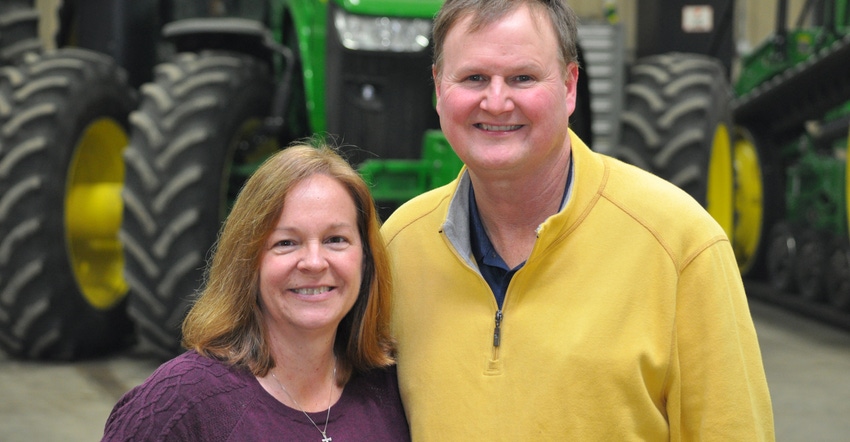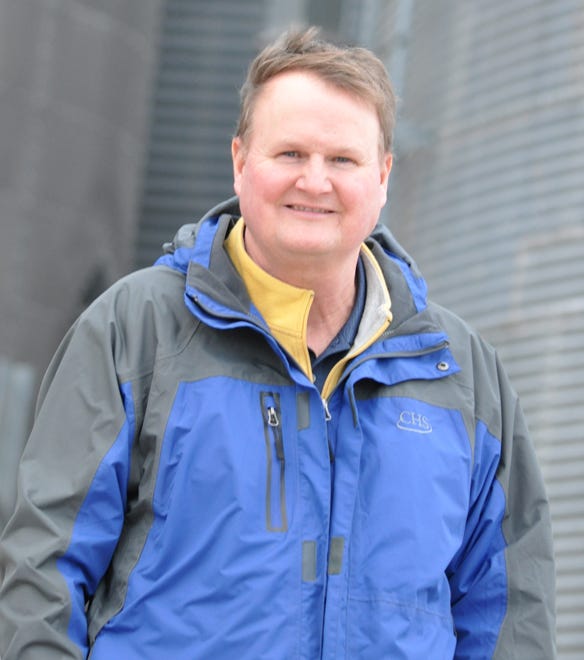
With a big welcoming smile and a quick introduction, 2017 Master Farmer Tracy Jones asks a simple question. “Where do we start?”
He’s ready to get down to business. Why? Tracy is a busy guy.
Tracy is grateful for his wife and high school sweetheart, Beth, an on-the-go mom of their three daughters: Kristen, a pharmacist; Katherine, a future occupational therapist; and Kortney, a high school senior. Beth declares herself the farm’s part-time runner and nurse, fetching parts from town and mending occasional wounds.
Tracy jokes it’s Beth’s job to keep him in line — a task she initiated as a high school cheerleader, leaving him treats and decorating his locker before basketball games. They’ve been together since the day she asked him to her junior year turnabout dance.
Tracy and Beth moved to the farm after marrying in 1984. Thirty-three years later, they still like to give each other a hard time, and Beth is still helping Tracy manage his ever-expanding list of activities on and off the farm.
On the farm
As a fourth-generation farmer, Tracy manages a beef and grain operation near Kirkland in DeKalb County. Tracy and his father formed a partnership after he finished high school, and he took over the farm in 1996 following his dad’s retirement. T. Jones Inc. is the corporate entity and includes the equipment, beef cattle and employee salaries. Jones Farm Partnership was formed in 2006 for the grain operation.
“We’ve fixed a lot of things, but the basics on the farm haven’t changed,” Tracy explains.
Tracy focuses on corn production with his 2,500 rented and owned acres. He mixes in a few hundred acres of soybeans and wheat for straw. All of Tracy’s family-owned acres touch, cutting down travel time and maximizing fieldwork efficiency for him and his two full-time employees.
Tracy uses conventional-tillage methods and split-applied nitrogen UAN solution right after planting and at sidedress. He runs variable-rate phosphorus and potassium, a practice he’s used from the start, and applies manure to the closest fields.
Tracy had one goal in mind when he invested in a new grain dryer and storage system: self-sufficiency. Every minute at harvest counts, and downtime waiting for trucks to return from town wasn’t part of his plans. Grain trucks are back to the field within minutes thanks to a half million bushels of on-farm storage.
New technology for documenting performance is a must for Tracy. He used computers early on for tracking profitability and adopted yield monitors, variable-rate applications and autosteer right after they launched. Climate FieldView is his latest tracking tool.
Wheat straw and roughly 10% of the corn that Tracy produces go to cattle feed; proximity to byproduct sources works in his favor. He sources corn gluten from a corn syrup and starch factory in Chicago and purchases dried distillers grains from ethanol plants in Rochelle and Peoria. He rounds out the feeding ration with roughage and corn.
Tracy feeds out 1,500 head of beef cattle every year, and purchases cattle from an order-buyer in Kentucky, a relationship started by his father. The cattle arrive weighing 700 to 800 pounds. After 70 to 80 days, Tracy works with an ultrasound technician to group all of the animals by back fat, marbling and weight — indicating their optimal market day.
“Why sell a 1,150-pound animal when he’s not done?” he notes. “Most people can’t tell by looking at them there’s a 300-pound difference.”
He groups cattle and identifies them by ear tag colors, and then sorts accordingly on shipment day, when the animals will travel 90 miles to Tyson in Joslin. After two years of a struggling cattle market, Tracy adjusted his marketing strategy by adding hedging to his “high-of-the-week agreement.”
Marketing isn’t getting any easier, he notes. “You can’t lose money and go to the bank and say, ‘We’re going to do the same thing,’ ” he explains.
His new strategy has its ups and downs. “I always say it’s not rocket science,” he notes. “We make money on the way up, hold our own at the level and lose our butts on the way down.”
Tracy hedges his cattle through CHS, an organization he is proud to be part of.
Off the farm
Tracy has done his part to support local agricultural organizations, including DeKalb County Farm Bureau, DeKalb-Kane Cattlemen’s Association and DeKalb County Corn Growers.
He found his calling with his current roles: CHS Elburn Co-op Board chairman and DeKalb County Board vice chairman.
Tracy’s journey with CHS Elburn began before it was CHS, serving on the Elburn Co-op Board in different leadership roles since 1996. His board member team played a critical role in merging CHS with Elburn Co-op, an alignment he believes was a great opportunity. Elburn Co-op supplies 20 million bushels a year to CHS at the Morris barge-loading facility, and originates grain for the CHS ethanol plant in Rochelle.
CHS Elburn recently expanded and will originate grain for the CHS ethanol plant in Annawan, and Pekin and Davenport, Iowa, grain terminals. “We’ve grown from a 40 million-bushel grain company to a 150 million-bushel grain company,” he explains.
With more than 20 years of co-op board experience, Tracy aspires to be on the CHS board of directors. He was not elected to the board last year, but feels the experience was worth the time and effort.
Tracy says his role on the DeKalb County Board is different; he’s a voice for agriculture. DeKalb County is deeply entrenched in ag but also home to Northern Illinois University. The diversity NIU brings to the community is a good thing, Tracy explains, but it also means someone needs to speak up for county farmers when issues like wind farms and propane storage facilities are on the agenda.
For Tracy, it’s all about representing agriculture in his community, his home county and beyond.
He understands that few people have the opportunity to be farmers. “I’m maximizing the opportunity I’m lucky to have.”

RELATIONSHIPS AND EXPERTISE: Tracy believes you can’t be an expert at everything, so establishing relationships with hardworking, knowledgeable people is the key to running a successful operation.

Educating others through farm tours
How do you host a harvest farm tour without stopping the combine? Tracy Jones welcomes the Sycamore eighth-grade class through a pre-recorded video played in his shop’s welcome area. The video features Tracy discussing the basics of harvest: how a combine works, where the grain goes and why. After the video, students continue their tour of the cattle barns and grain bins. The 15-year tradition is coordinated by the DeKalb County Farm Bureau.
Students aren’t the farm’s only visitors. Tracy has hosted several groups of Brazilian farmers who are in the Midwest to enjoy the Farm Progress Show, part of a tour coordinated by his county Farm Bureau or agritourism companies. The effort started several years ago when Doug Dashner, DeKalb County Farm Bureau, formed a company called DeKalb Farm Tours. The farm tour group included 15 farmers with various machinery, crops and livestock.
“People need to know what we do as farmers,” Tracy says. “If you don’t share it, how do you expect anyone to know?”
MASTER AT A GLANCE
Tracy Jones
Wife: Beth
Children: Kristen, Katherine, Kortney Jones
County: DeKalb
Operation: 2,256 acres of corn; 200 acres of soybeans; 60 acres of wheat; 1,500-head beef cattle finishing operation
Leadership: DeKalb County Board, Elburn Co-op Board, DeKalb County Farm Bureau, DeKalb-Kane Cattlemen’s Association, DeKalb County Corn Growers, Sycamore Fire Protection District Board, Mayfield Township trustee and clerk
Nominator: Scott Newport, DeKalb County Master Farmer Nominating Committee coordinator
About the Author(s)
You May Also Like




